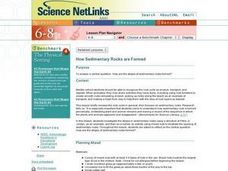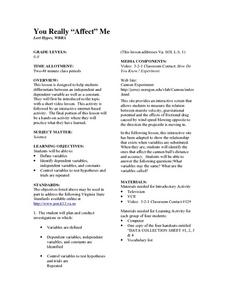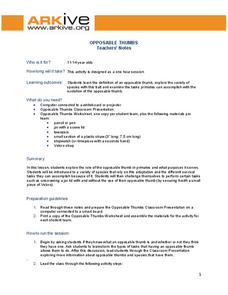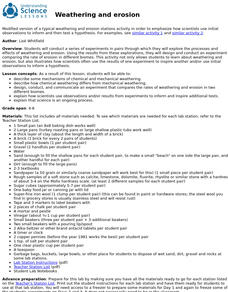Curated OER
Convection Activities
Students conduct a series of hands-on activities to demonstrate that heated air expands and that warm air rises because it is less dense.
Curated OER
PRIMARY Activity: Racing Jars
Students explore how mass affects speed in this hands-on physics experiment. In this mass and speed lesson, students fill a baby food jar with water and leave a second jar empty. They roll the 2 jars down a ramp to observe which jar will...
Exploratorium
Holding Charge
Slide paper over a plastic straws to generate static electricity, and then stick that straw to glass, a wall, or even your own hands! This is a science activity that students can use to show parents what they learn in school whenever...
Cornell University
Nano What?
The size of a nanoparticle is difficult for pupils to grasp. A hands-on experiment is designed to give your classes perspective. Learners analyze different sports drinks for the content of electrolytes as an introduction to nanoscale....
Curated OER
Bones Provide Great Support!
How do bones help people move around? A science investigation prompts kids to draw arrows to certain bones that protect their organs. After they finish, they trace their hands on a piece of paper and trace the way their bones go. Great...
Curated OER
Animal Homes
Match animals to their environments with a cute lab activity. Kids draw a line between each animal, such as a fish, a rabbit, and an ant, to the place where it lives. For hands-on practice, a science investigation instructs learners to...
Curated OER
Ready-Set-Tech: When a Volcano Erupts
Wouldn't it be a blast to uncover the science behind volcanic eruptions? Explore, research, and examine the nature of volcanoes with three fun hands-on projects kids will love. First the class takes to the Internet to research volcanoes....
Curated OER
Disguise for the Eyes
Young scientists discover how many, many animals use color as a way of helping them to survive in the wild. They understand how animals use color in their everyday lives. Pupils engage in hands-on activities, watch videos, access...
Curated OER
How Sedimentary Rocks are Formed
Students investigate the stripes in sedimentary rocks, using a structure at Petra, Jordan, as an example, and then do a hands-on activity using mixed nuts to illustrate the layering of sedimentary rocks.
Curated OER
You Really "Affect" Me
Middle schoolers examine the effects of variables. They view a video which introduces the concepts, take part in an internet-based activity, then engage in a hands-on activity which allows them to practice what they have been studying.
ARKive
Opposable Thumbs
How do opposable thumbs help you complete certain tasks? An activity about evolutionary traits prompts learners to try writing their name, twist the lid off of a jar, and use tweezers to pick up a straw, first with their normal grip, and...
National Nanotechnology Infrastructure Network
Taking a Closer Look at Objects
Take a close look at the world around you with an activity that magnifies everyday objects. Five explorations examine items under intense magnification and pose a series of questions that encourage critical thinking and following...
Columbus City Schools
The Mystery of Earth’s History
Every living creature can leave a fossil record, yet most fossils belong to extinct organisms rather than ones currently living. Scholars learn about dating rock layers, fossils, and the environment of the past. Pupils understand that...
Curated OER
Wipe Out
Learners examine the flow of water. They observe and test the properties of water by using sticks in flowing water. The instructional activity has streaming video, resource links to access, and a good hands-on activity that is clearly...
Perkins School for the Blind
Mixtures and Solutions
Mixtures and solutions are different; one can be separated fairly easily and the other cannot. This hands-on experiment was written specifically for learners with visual impairments or blindness. They will use lemonade and trail mix to...
NASA
Cosmic Microwave Background
Begin your next class with a BANG! Pupils discuss the formation of our universe and its expansion before proceeding with an activity designed to demonstrate what most likely occurred billions of years ago. They conclude with a discussion...
Center for Technology in Teaching and Learning
CSI: The Experience - Family Forensics
Forensic scientists depend on their observation skills to analyze evidence down to the molecular level. Middle and high schoolers practice making observations and predictions with a series of crime scene activities, which includes a...
University of California
Weathering and Erosion
Just how powerful is erosion? Interested scientists learn how to identify the results of erosion with a series of lab activities. They move through stations to experiment with different types of erosion and then design and complete their...
Curated OER
All About Seeds!
How do fruits relate to flowers and seeds? Identify the seeds and their purpose with a coloring activity for kindergartners. Once they color the seeds of apples, bananas, and peas (among others), kids get hands-on experience with bean...
Curated OER
Being Shadowed
What causes a shadow to appear? Have kindergartners and first graders explore shadows with a fun science activity. After reading a short paragraph about light sources, they draw a shadow for a little girl based on the location of the...
Curated OER
Form and Observation
Use a familiar song and adorable baby animal pictures to teach youngsters about genetic variation. Begin by listening to "Twelve Variations on 'Ah vous dirai-je Maman,'" which you will need to find online (there are several versions...
Space Awareness
What is Time?
Does it ever seem like time is slipping through your fingers? Model the passing of time with an hourglass activity in which individuals determine whether hourglasses are the most efficient way to measure time.
Curated OER
Earthquakes and Volcanoes
Even though volcanoes look alike, they can be very different based on the types of lava that erupts from their surface. Learn about strata volcanoes, shield volcanoes, and the varying viscosity of lava with an engaging hands-on...
NOAA
Technology II
Ping, ping, ping. The last installment of a 23-part NOAA Enrichment in Marine sciences and Oceanography (NEMO) program explores technology use in marine studies, such as sonar. Activity involves simulating sonar techniques to identify a...

























